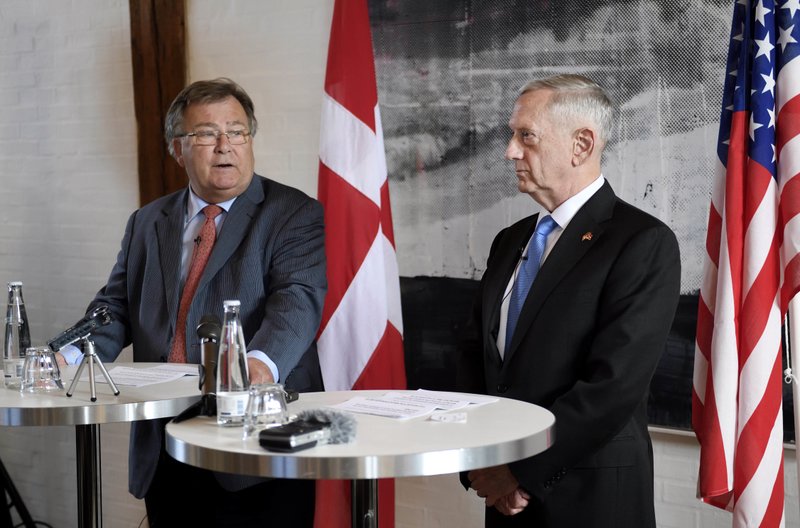WASHINGTON -- President Donald Trump's administration announced Tuesday that it will arm Syria's Kurdish fighters "as necessary" to recapture the key Islamic State stronghold of Raqqa, despite intense opposition from NATO ally Turkey, which sees the Kurds as terrorists.
The U.S. decision is meant to accelerate the Raqqa operation but undermines the Turkish government's view that the Syrian Kurdish group is an extension of a Kurdish terrorist organization that operates in Turkey. Washington is eager to retake Raqqa, arguing that it is a haven for Islamic State operatives to plan attacks on the West.
Also on Tuesday, Russia was seeking the endorsement of the United Nations Security Council for an accord it reached with Turkey and Iran to set up safe zones in Syria, the latest attempt at a cease-fire in a 6-year-old civil war that has left hundreds of thousands dead.
But Western diplomats said they need more details of the plan before letting the Security Council give its backing.
[PRESIDENT TRUMP: Timeline, appointments, executive orders + guide to actions in first 100 days]
"We need a bit more information about what this agreement means and implies, and if we get that, I'm sure we could agree to a good and supportive resolution," said Olof Skoog, Sweden's U.N. ambassador. "There have been agreements and cease-fires in the past, but not implemented and not monitored."
The latest initiative signed in Astana, the capital of Kazakhstan, calls for the establishment of four zones patrolled by foreign forces -- possibly including Iranian troops -- in the northwestern Idlib province; Homs province in the west; the East Ghouta suburb of the capital, Damascus; and southern Syria. The plan also calls for a halt to flights over the "de-escalation zones" and humanitarian access.
Russia has circulated a draft resolution at the United Nations that calls "on all member states to contribute in good faith to the implementation of the Memorandum on the creation of de-escalation areas in the Syrian Arab Republic," according to the text seen by Bloomberg.
Dana White, the Pentagon's chief spokesman, said in a written statement that Trump authorized the arms Monday. His approval gives the Pentagon the go-ahead to "equip Kurdish elements of the Syrian Democratic Forces as necessary to ensure a clear victory over ISIS" in Raqqa, said White, who was traveling with Defense Secretary James Mattis in Europe. She used an acronym to refer to the Islamic State.
The U.S. sees the Kurdish-led Syrian Democratic Forces as its most effective battlefield partner against the Islamic State in northern and eastern Syria. White said they're "the only force on the ground that can successfully seize Raqqa in the near future."
While White did not mention the kinds of arms to be provided to the Kurds, other officials had indicated in recent days that 120mm mortars, machine guns, ammunition and light armored vehicles were possibilities. They said the U.S. would not provide artillery or surface-to-air missiles. The officials weren't authorized to publicly discuss the matter and demanded anonymity.
Former President Barack Obama's administration had been leaning toward arming the Syrian Kurds but struggled with how that could be done without torpedoing relations with Turkey, which is a U.S. ally in NATO and a key political actor in the greater Middle East. The issue has come to a head now because battlefield progress this year has put the U.S.-backed Syrian Democratic Forces nearly in position to attack the Islamic State in Raqqa, although they are still attempting to isolate the city.
In her statement, White said the U.S. prioritizes its support for the Arab elements of the Syrian Democratic Forces.
"We are keenly aware of the security concerns of our coalition partner Turkey," she said. "We want to reassure the people and government of Turkey that the U.S. is committed to preventing additional security risks and protecting our NATO ally."
Other officials said Trump's authorization includes safeguards intended to reassure the Turks that the additional U.S. weaponry and equipment will not be used by the Kurds in Turkey. The intent is to restrict the distribution and use of the weaponry by permitting its use for specific battlefield missions and then requiring the Kurds to return it to U.S. control.
Turkish President Recep Tayyip Erdogan is to visit Trump in Washington next week. An Erdogan adviser, Ibrahim Kalin, met on Tuesday with Thomas Shannon, the State Department's No. 2 official.
And in Denmark earlier Tuesday, Mattis said he had useful discussions with Turkey and described the two countries as working out differences over a U.S. alliance with Syrian Kurds in fighting Islamic State militants.
"That's not to say we all walk into the room with exactly the same appreciation of the problem or the path forward," Mattis told reporters after meeting with officials from more than a dozen nations also fighting the Islamic State. Basat Ozturk, a senior Turkish defense official, participated.
"We're going to sort it out," Mattis said. "We'll figure out how we're going to do it."
In Syria, government forces and U.S.-backed opposition fighters clashed on Tuesday in a remote desert area near the borders with Iraq and Jordan, where tensions have been rising.
The clashes came a day after pro-Syrian media said U.S., British and Jordanian forces were "massing" on the Jordanian side of the border. The report was likely a reference to an annual U.S.-Jordanian military drill known as "Eager Lion."
The Britain-based Syrian Observatory for Human Rights said Tuesday's clashes were underway on the southern edge of Syria's central Homs province, where government forces have been on the offensive for days.
Tlas al-Salameh, the commander of a rebel faction know as Eastern Lions, said government warplanes carried out raids against his group without causing casualties.
Information for this article was contributed by Robert Burns, Lolita C. Baldor, Richard Lardner, Matthew Lee, Sarah el Deeb and Sam McNeil of The Associated Press; and by Kambiz Foroohar of Bloomberg News.
A Section on 05/10/2017
